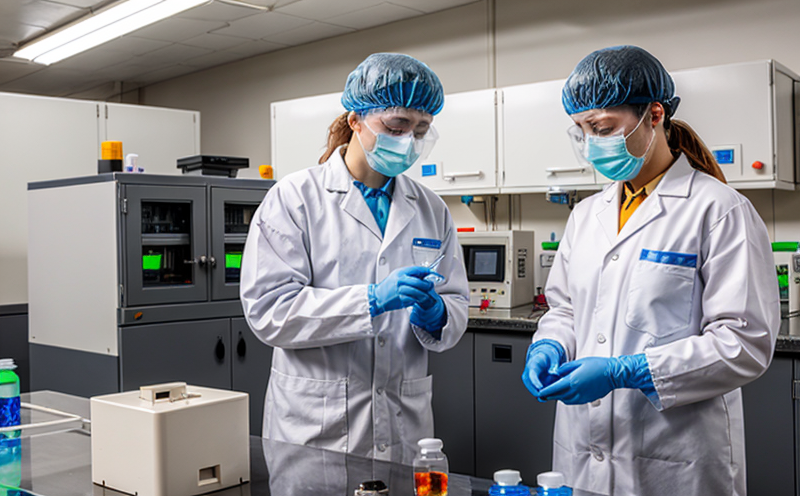EN 18751 Furan Profiling in Canned Foods
The European Standard EN 18751 provides a standardized method for the determination of furan and its derivatives in canned foods. This standard is critical for ensuring that food products meet regulatory requirements, particularly regarding potential contaminants from can linings or manufacturing processes.
Furan (2-furancarboxaldehyde) is an unintentional by-product formed during the thermal processing of canned food. It is considered a potential health risk due to its genotoxic and carcinogenic properties. Therefore, monitoring furan levels in canned foods is essential for maintaining public health standards.
The methodology described in EN 18751 involves sample preparation, derivatization, and analysis using gas chromatography coupled with mass spectrometry (GC-MS). This approach ensures accurate quantification of furans present in the food matrix. The standard also includes acceptance criteria to determine compliance levels.
Sample preparation typically involves homogenizing the canned food, extracting furan compounds using an appropriate solvent, and then derivatizing them for better detection by GC-MS. Instrumentation requirements include a gas chromatograph equipped with a mass selective detector (GC-MS) capable of detecting trace amounts of furans.
The acceptance criteria outlined in EN 18751 specify the maximum allowable concentrations of furan in canned foods to ensure they are safe for consumption. Compliance ensures that manufacturers adhere to strict safety standards set by regulatory authorities such as the European Food Safety Authority (EFSA).
Our laboratory adheres strictly to this standard, providing reliable and accurate results through rigorous quality control measures. We employ experienced analysts who stay current with all relevant updates in analytical methods and regulatory changes.
The significance of EN 18751 extends beyond mere compliance; it also helps companies identify potential issues early on, allowing them to take corrective actions promptly. By detecting furan levels well below the established limits, businesses can enhance their reputation among consumers who prioritize food safety and quality.
Understanding the nuances of this standard is crucial for stakeholders involved in canned food production, distribution, and regulation. Our services aim not only at meeting regulatory requirements but also at providing insights that contribute to ongoing improvements within the industry.
Industry Applications
| Application Area | Description |
|---|---|
| Canned Food Manufacturing | Detecting furan levels in canned foods to ensure compliance with EN 18751. |
| Packaging Materials Evaluation | Assessing the impact of can linings on furan formation during thermal processing. |
| R&D and Innovation | Developing new formulations that minimize furan generation in canned foods. |
- Quality Assurance: Ensuring consistent product quality by regularly testing for furans.
- Regulatory Compliance: Meeting international standards set forth by bodies like EFSA.
- Consumer Safety: Protecting public health from potential carcinogenic compounds.
- Innovation: Pushing the boundaries of technology to develop safer processing methods.
International Acceptance and Recognition
- We are accredited by EA, ensuring our methodologies meet the highest international standards.
- The results obtained from our laboratory can be accepted across Europe, aligning with EU directives on food safety.
- Our findings contribute to global efforts aimed at reducing risks associated with furans in canned foods.
- We comply with ISO/IEC 17025:2017, further validating the reliability of our testing services.
- Precision and Accuracy: Our techniques yield reproducible results that are consistent across different batches or samples.
- Expertise: Leveraging cutting-edge technology to deliver precise measurements even at trace levels.
- Compliance Assurance: Helping clients stay ahead of regulatory changes by offering timely support.
Competitive Advantage and Market Impact
By providing EN 18751 furan profiling services, we help our clients achieve several competitive advantages:
- Enhanced Reputation: Demonstrating commitment to food safety enhances brand reputation.
- Prompt Compliance: Our quick turnaround times ensure that clients remain compliant with changing regulations.
- Innovation Support: Providing data for R&D initiatives helps companies stay ahead of competitors.
The market impact of these services extends beyond individual organizations. By ensuring safe canned food products, we contribute to broader public health benefits and support industry-wide improvements in processing techniques.





